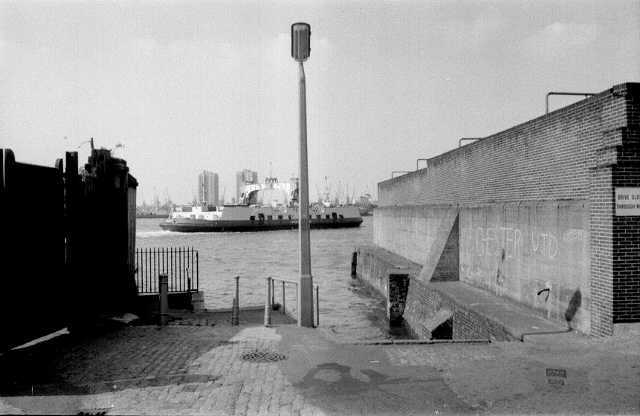

|
The first two ships were the Gordon and the Duncan built in 1888 by R.H. Green. The Hutton joined them later, built in 1893 by William Simons and Co Ltd. The Gordon was named after General Gordon the hero of Khartoum (1833 - 1885). The Duncan after Colonel Francis Duncan (1836 - 1888) Author of 'The history of the Royal Artillery'. The Hutton after Charles Hutton (1737 - 1823) professor of mathematics at the Woolwich Academy |
| Woolwich Free Ferry, John Benn - Circa 1930.
Photo by W. D. Chalklin The John Benn was named after Sir John Benn (1850
- 1922), ancestor of to days Tony Benn MP. A member of the LCC from it's
creation in 1889 and it's chairman from 1904-05, he was also MP for Devonport
for six years.
Information 'Free for all. A celebration of 100 years of the Woolwich Free Ferry, Greenwich Libraries. 1989. |

| The Woolwich Ferry as seen from Bell Water Gate, Woolwich in June 1970.
The whole of this area has now been swept away. The power station beyond
the wall has been demolished and tuned into a car park. There is also an
open area fronting the river.
Photograph. John King |
| There was an ancient ferry between North Woolwich
and Warren Lane. In 1308 it was sold for £10. An Act of Parliament
was passed in 1811 for the establishment of another ferry at Woolwich.
There were various other ferries which operated between the two halves
of Woolwich town.
The idea for a steam ferry was first proposed in about 1850, nothing became of this. Then on 18 October 1880 a public meeting was held at the Town Hall Woolwich, to call for the establishment of a ferry from local resources. The Metropolitan Board were asked to provide a ferry by the inhabitants of the town to offset the cost that the town had contributed to building and maintaining bridges in the west end. The idea eventually prevailed and the Free Ferry was opened on Saturday 23 March 1889. It was opened by Lord Roseberry, Chairman of the L.C.C. amid much celebration. The town was arrayed with flags and bunting. A procession paraded through the streets. Because of a problem with the hydraulic apparatus vehicular traffic didn't start until Friday 3 May 1889. The two steamers were named Gordon and Duncan, after two local military heroes. After all the hard work put in by the Metropolitan Board of Works it fell to the newly formed London County Council to open the ferry. The Metropolitan Board ceased to exist three days prior to the opening date. In 1922 the two original boats were replaced by two new ones The Squires and a new Gordon. In 1930 two new boats were added The Will Crooks and John Benn. As time went by and lorries got larger, the town centre of Woolwich was filling up with traffic waiting to cross the river, also pressure was put on the old boats carrying such heavy loads. In 1963 three new diesel boats started operating, first of all at the old piers, then at new terminal a little down the road, thus avoiding the centre of town. At first the traffic queued in John Wilson Street a new dual carriageway, the waiting traffic used one lane, and the other was used by through traffic. Sometime later a waiting area was built adjacent to the South terminal, so keeping the road clear. On the North side a lane was set aside in Pier Road, separated by a kerbstone from the rest of the road. The three new boats were the James Newman, John Burns, and Ernest Bevin. The new piers came into use in 1966 The running of the Ferry was handed over to the new Greater London Council in 1965, and after it's demise in 1986 to The London Borough of Greenwich. Responsibility is now with Transport for London. In foggy weather workers would often loose half or even a whole days pay when the ferries couldn't operate. sometimes this would result in them being dismissed. To alleviate this problem a foot tunnel was built, it was opened October 26 1912. |
| Woolwich Free Ferry. Ernest Bevin - July 1970.
Photo by J. King. The Ernest Bevin is named after Ernest Bevin (1881 - 1951), pioneer of modern trade unionism. A minister in two governments and Labour MP for Woolwich during the last year of his life, Bevin was affectionately as "the dockers' KC". Built in 1963 at the Caledon Shipbuilding and Enineering Co Ltd shipyards in Dundee, and they entered sevice the same year. The cranes of the docks in the above picture have now been replaced by the Docklands Airport runways. |
For more on the Woolwich Free
Ferry
This page was designed and is maintained by Toby and John King, I would accept any comments or questions See Index Page